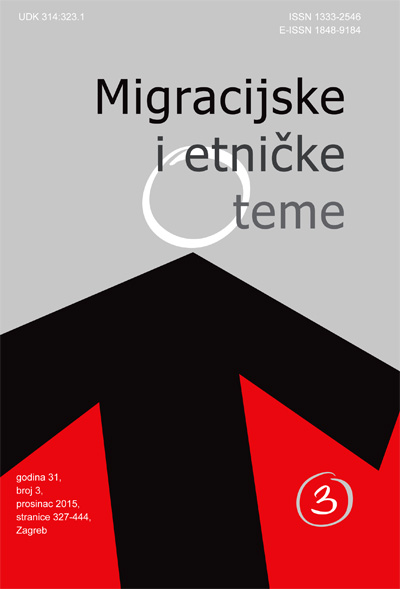Strani maloljetnici bez pratnje u Republici Hrvatskoj: problematika učenja jezika i obrazovanja
Foreign Unaccompanied Minors in the Republic of Croatia: the Issue of Language Learning and Education
Author(s): Drago Župarić-Iljić, Dubravka MlinarićSubject(s): Education, School education, State/Government and Education, Demography and human biology, Migration Studies, Ethnic Minorities Studies
Published by: Institut za migracije i narodnosti
Keywords: unaccompanied minors; language learning; education; integration policies; Croatia
Summary/Abstract: Modern mixed migration flows include children separated from their parents and unaccompanied minors, who are among the most vulnerable groups of migrants. From 2006 to July 2014, a total of 3255 foreign unaccompanied minors were registered in Croatia, of whom about 400 were asylum seekers, mainly citizens of Afghanistan, Pakistan and Somalia. It is obvious that they stay shortly in the institutions entitled for their care and arbitrarily leave them within just a few weeks from the day of arrival. Policies and measures aimed at the welfare and protection of foreign unaccompanied minors include state mechanisms in the domains of establishing the identity and age of a minor, appointment of a guardian, ensuring accommodation and freedom of movement, legal and financial support, health and social care, language learning, education and ensuring their reunification with family. The focus of this paper is on the analysis of policies and measures related to language learning and the education of foreign unaccompanied minors, which is one of the basic prerequisites of their inclusion in society. Based on research conducted by the interview method among the relevant actors involved in the system of their protection and care, some of the most important challenges, primarily in the field of educational, but also of the broader integration of foreign unaccompanied minors have been analysed. Preliminary results suggest that their brief stay in Croatia and early drop-out of the system prevents the implementation of the national care program guaranteed by the legal framework, which partly makes it impossible for the state to systematically and effectively plan and implement further activities in the education of children of foreigners. Lack of inter-agency and intra-agency coordination within the government sector leads in this area to institutional problems and inconsistency in the implementation of the existing national regulations and European standards.
Journal: Migracijske i etničke teme
- Issue Year: 2015
- Issue No: 3
- Page Range: 333-363
- Page Count: 31
- Language: Croatian

